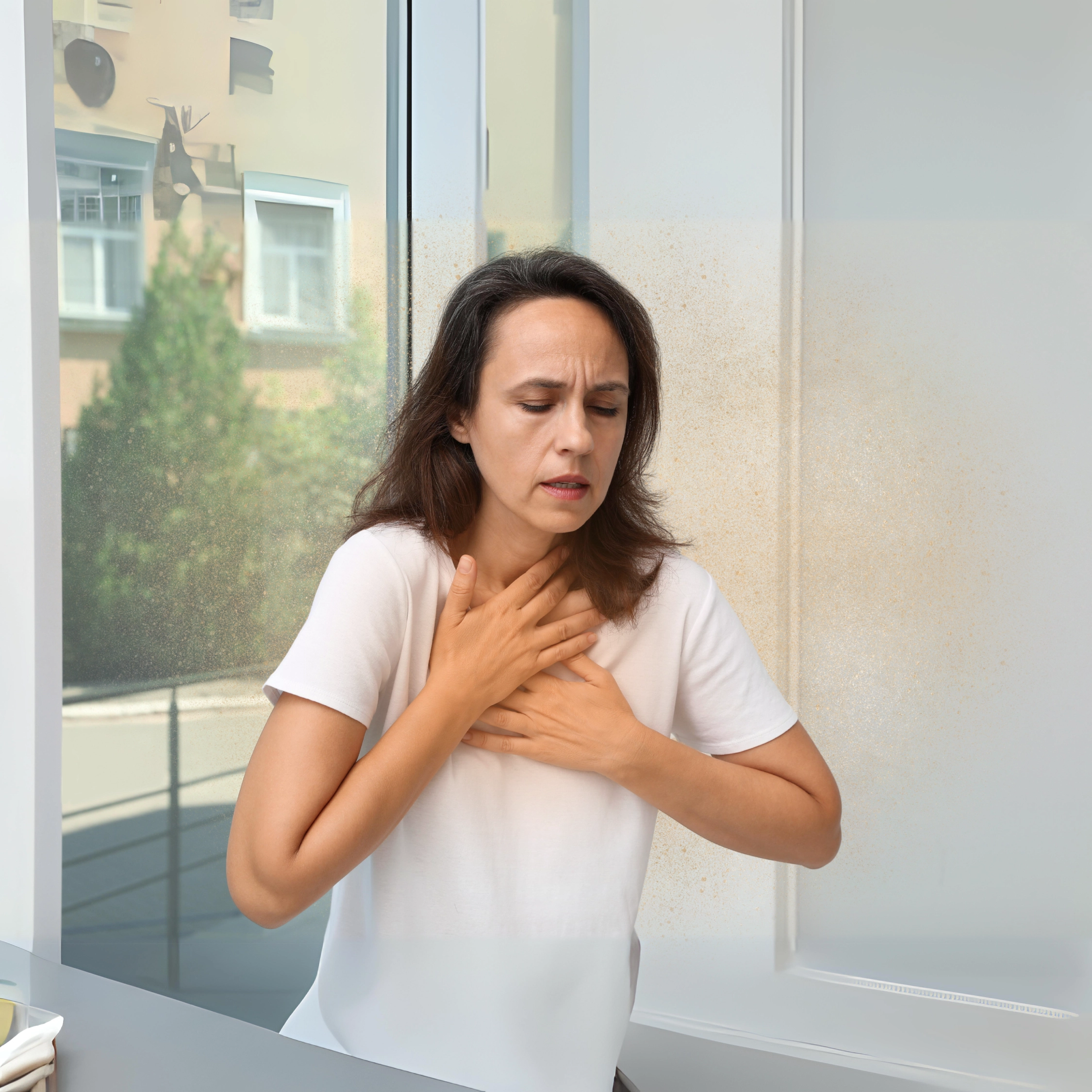10 shocking ways you’re destroying your lungs every day
In honour of Lung Health Day

Today is Lung Health Day, the perfect reminder to pay attention to your respiratory system, an often-overlooked but essential part of your overall well-being. While we’re all aware that smoking is bad for our lungs, there are many less obvious daily habits that could be harming them, too. Especially if you’re living in a country like Thailand, certain environmental factors also come into play. Below are ten ways you might be damaging your lungs without even realising it.
1. Breathing in Bangkok’s air pollution
If you live in a busy city like Bangkok, the air pollution is hard to escape. The PM2.5 particles from vehicle emissions and construction can lodge deep into your lungs, causing irritation and inflammation.
Research has shown that long-term exposure to air pollution, especially in urban areas like Bangkok, can significantly damage lung function over time, contributing to respiratory problems such as asthma or bronchitis. Wearing a mask when pollution levels are high or using an air purifier at home can help limit your exposure.
2. Secondhand smoke exposure
Even if you’re a non-smoker, you might still be breathing in harmful chemicals from cigarette smoke if you’re regularly around people who smoke. Thailand has strict smoking bans in public places, but secondhand smoke can still be an issue in certain areas, especially in social settings or at bars and restaurants. Research shows that exposure to secondhand smoke can increase the risk of lung cancer by 20 to 30%. This is why it’s vital to avoid smoking areas and encourage your friends and family to take their smoking habits outdoors.
3. Using strong cleaning products
Those strong cleaning chemicals that leave your house sparkling might be doing more damage than good to your lungs. Many cleaning products contain volatile organic compounds (VOCs) that, when inhaled, can irritate your respiratory tract and trigger asthma-like symptoms. Opt for natural or eco-friendly products whenever possible and keep windows open while cleaning to improve ventilation.

4. Living with dust mites and mould
In Thailand’s humid climate, homes can easily accumulate dust mites and mould, especially during the rainy season. Both are known to trigger allergies and asthma, with dust mites thriving in carpets, bedding, and furniture. Fibre, like from carpets, can trap dust, dirt, and toxins over time, releasing these particles into the air every time you walk on them. Vacuum regularly, wash bedding in hot water, and use dehumidifiers to keep moisture levels down.
5. Ignoring chronic coughs
If you’ve had a persistent cough for more than three weeks, it’s important not to ignore it. Chronic coughing can be a sign of underlying lung problems such as bronchitis, asthma, or even lung cancer. Many people in Thailand, especially expats, may overlook these symptoms, thinking they’re just adjusting to a new climate or air quality. Don’t hesitate to consult a doctor for early intervention. Comprehensive health insurance plans like those from Cigna cover respiratory checkups, helping you stay on top of your lung health.
- Get a Free Lung cancer screening test worth about 6,500 Thai baht in Thai hospitals!
- Get access to top hospitals and lung specialists.
6. Burning incense or candles
Burning incense or scented candles might create a calming atmosphere, but it also releases particulate matter and toxins into the air, which can affect lung health. Studies have shown that burning incense indoors increases the risk of lung cancer due to prolonged exposure to these pollutants. While traditional practices are valued in Thailand, it’s wise to reduce the use of these items indoors, especially in poorly ventilated areas.

7. Cooking with poor ventilation
Traditional Thai cooking often involves frying or grilling at high temperatures, releasing a significant amount of smoke into the air. Gas stoves, common in many Thai homes, emit harmful nitrous oxide when cooking. If your kitchen isn’t well-ventilated, these fumes can damage your lungs over time.
Research shows that consistent exposure to cooking smoke, especially from charcoal or gas stoves, can increase the risk of chronic respiratory diseases. Always ensure your kitchen has proper ventilation or install an exhaust fan to keep the air clear.
8. Poor indoor air quality
Thailand’s rapid urbanisation means that construction and vehicle emissions contribute to poor outdoor and indoor air quality. Be aware if you live in those areas. Dust, allergens, and pollutants can build up inside homes, especially if you’re using air conditioners without regularly cleaning the filters. Consider investing in a high-quality air purifier and routinely check air conditioner units to make sure they’re not circulating harmful particles.
9. Being around pigeons in tourist areas
In most tourist attractions across Thailand, pigeons are everywhere, whether you’re at temples or walking along the streets. While feeding or catching pigeons may seem harmless, it could expose you to “bird fancier’s lung,” a condition triggered by inhaling particles from bird droppings and feathers. This can cause inflammation in your lungs, leading to respiratory problems over time. It’s best to stay aware of this risk and avoid close contact with pigeons, especially in areas where they gather in large numbers.

10. Poor posture
It might surprise you, but poor posture can restrict lung expansion, limiting the amount of oxygen your body gets. Whether you’re sitting at a desk or lounging on the sofa, bad posture compresses your lungs. Make an effort to sit up straight throughout the day, especially if you’re working long hours, to improve your lung function.
Protecting your lungs starts today
Now that you’re aware of these everyday habits that might be harming your lungs, it’s time to make small but impactful changes. Whether it’s investing in an air purifier, being mindful of your environment, or cutting back on certain activities, protecting your lungs is a key step toward a healthier future. And if you’re living in Thailand, where air quality can fluctuate, having a solid health plan can give you peace of mind. Plans from Cigna, for instance, are tailored for expats and offer comprehensive coverage for respiratory conditions and screenings.

How Cigna plans can help with lung health
Cigna offers a range of plans designed specifically for expats living in Thailand. Their plans cover a variety of health concerns, including respiratory issues. If you experience symptoms like a persistent cough, shortness of breath, or want to schedule regular check-ups to monitor your lung health, Cigna’s plans ensure you can access the right medical care when you need it.
Cigna offers a variety of plans:
Cigna global health (silver plan)
- Best for: Those looking for affordable coverage with essential benefits.
- Lung health benefits: Routine respiratory screenings, emergency care for acute respiratory issues, and access to general practitioners.
- Covers $225 of the Lung cancer screening
Cigna gold plan
- Best for: Expats who want enhanced coverage with access to private hospitals.
- Lung health benefits: Comprehensive lung health screenings, specialist consultations, and tests for chronic conditions like asthma or COPD.
- Covers $450 of the Lung cancer screening
Cigna platinum plan
- Best for Those needing premium, comprehensive coverage with high limits.
- Lung health benefits: Full respiratory health coverage, including ICU access, hospitalisation for serious lung infections, and intensive specialist care.
- Fully cover the Lung cancer screening
- Get a Free Lung cancer screening test worth about 6,500 Thai baht in Thai hospitals!
- Get access to top hospitals and lung specialists.
Remember, your lungs work around the clock, so take care of them today and every day.
Latest Thailand News
Follow The Thaiger on Google News:


























